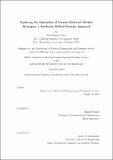Exploring the optimality of various bacterial motility strategies : a stochastic hybrid systems approach
Author(s)
Norris, Noele Rosalie
DownloadFull printable version (1.603Mb)
Other Contributors
Massachusetts Institute of Technology. Department of Electrical Engineering and Computer Science.
Advisor
Emilio Frazzoli.
Terms of use
Metadata
Show full item recordAbstract
While many species of bacteria are motile, they use various random strategies to determine where to swim. This chemotaxis allow bacterial populations to distribute themselves in accordance to distributions of nutrients found within an environment. We extend past work describing a chemotactic E. coli cell as an ergodic, stochastic hybrid system and use experimental data on bacterial motion in microfluidic environments to model other species of bacteria. Our focus is on understanding the differences between the run-and-tumble strategy of E. coli and the more complicated run-reverse-flick strategy of the marine bacterium Vibrio alginolyticus. We use stochastic stability theory to analyze the chemotaxis models in terms of their stationary distributions and also derive a diffusion approximation of the system that provides further insight into the performance of various strategies. By comparing general chemotactic strategies, we hypothesize why various strategies may be evolutionarily advantageous for particular environments. These results also provide intuition for designing minimalistic multi-agent robotic systems that can be used for various environmental monitoring and source-seeking tasks.
Description
Thesis (S.M.)--Massachusetts Institute of Technology, Dept. of Electrical Engineering and Computer Science, 2013. This electronic version was submitted by the student author. The certified thesis is available in the Institute Archives and Special Collections. Cataloged from student-submitted PDF version of thesis. Includes bibliographical references (pages 109-113).
Date issued
2013Department
Massachusetts Institute of Technology. Department of Electrical Engineering and Computer SciencePublisher
Massachusetts Institute of Technology
Keywords
Electrical Engineering and Computer Science.